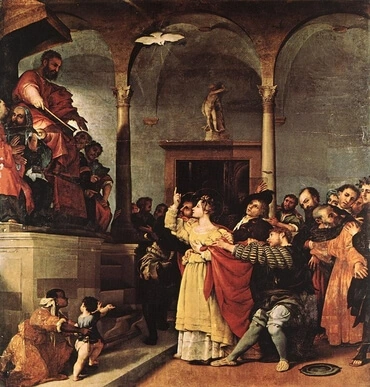1
Когда Ефрем говорил, все трепетали. Он был высок в Израиле; но сделался виновным через Ваала, и погиб.
2
И ныне прибавили они ко греху: сделали для себя литых истуканов изсеребра своего, по понятию своему, – полная работа художников, – и говорят они приносящим жертву людям: „целуйте тельцов!"
3
За то они будут как утренний туман, как роса, скоро исчезающая, как мякина, свеваемая с гумна, и как дым из трубы.
4
Но Я – Господь Бог твой от земли Египетской, – и ты не должен знать другого бога, кроме Меня, и нет спасителя, кроме Меня.
5
Я признал тебя в пустыне, в земле жаждущей.
6
Имея пажити, они были сыты; а когда насыщались, топревозносилось сердце их, и потому они забывали Меня.
7
И Я буду для них как лев, как скимен буду подстерегать при дороге.
8
Буду нападать на них, как лишенная детей медведица, и раздирать вместилище сердца их, и поедать их там, как львица; полевые звери будут терзать их.
9
Погубил ты себя, Израиль, ибо только во Мне опора твоя.
10
Где царь твой теперь? Пусть он спасет тебя во всех городах твоих! Где судьи твои, о которых говорил ты: „дай нам царя и начальников"?
11
И Я дал тебе царя во гневе Моем, и отнял в негодовании Моем.
12
Связано в узел беззаконие Ефрема, сбережен его грех.
13
Муки родильницы постигнут его; он – сын неразумный, иначе не стоял бы долго в положении рождающихся детей.
14
От власти ада Я искуплю их, от смерти избавлю их. Смерть! где твое жало? ад! где твоя победа? Раскаяния в том не будет у Меня.
15
Хотя Ефрем плодовит между братьями, но придет восточный ветер, поднимется ветер Господень из пустыни, и иссохнет родник его, и иссякнет источник его; он опустошит сокровищницу всех драгоценных сосудов.
16
(14:1) Опустошена будет Самария, потому что восстала против Бога своего; от меча падут они; младенцы их будут разбиты, и беременные их будут рассечены.








